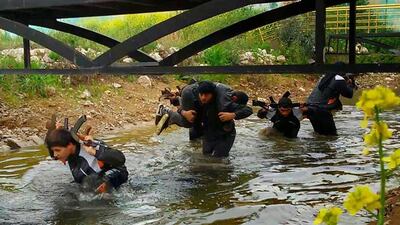The militant group ISIL likes to boast, as per its Arabic slogan “Baqiya wa tatamaddad”, that it is “remaining and expanding”. But research by an analytics company suggests that during 2015 ISIL actually shrunk, losing around 15 per cent of its territory.
IHS, based in the US, used social media sources to estimate how much groups in the Syrian civil war gained and lost during the past year.
The analysis shows that the two big losers of the last year, in terms of territory, were the Assad regime and ISIL – both lost around 15 per cent of their territory. The biggest winners, by a long margin, were Syria’s Kurds, who moved into the spaces in northern Syria vacated by ISIL – their territory expanded by 186 per cent.
Where ISIL lost out is also interesting: in the areas around Aleppo in Syria and Mosul in Iraq, and especially along the strategic corridor that links the territory it controls in Iraq’s north with the capital Baghdad. That has been a key focus for Iraq and its allies, who fear a march towards Baghdad.
Similarly to the capital’s west, along the road to Ramadi, the Iraq army took territory leading to the city, and yesterday marched into the centre of Ramadi itself. The other big losses came in Syria’s north, along the border with Turkey, denying the group the ability to easily expand into a neighbouring country.
Shrinking ISIL’s territorial grasp is a key part of defeating the group. By allowing it to hold territory, ISIL gains the ability to bring in recruits easily, train them and plan attacks – thus making attacks inside Iraq and Syria, or outside, such as in Paris last month, much easier. Being able to hold territory also gives the group access to funds, either from forced “taxation”, extortion, confiscation or by selling oil from the refineries under its control. And, of course, most importantly, destroying the territory ISIL holds will mean freeing the millions who live under their brutal yoke.
Stopping ISIL’s expansion is key to finally destroying its presence in its so-called “capital” of Raqqa and Mosul. Even after that, however, ISIL’s ideology will continue – as the ideology of other militant groups like Al Qaeda has continued. That will require another strategy. But first its territory must be destroyed.
If 2015 was the year that ISIL stopped “expanding”, 2016 must be the year it finally stops “remaining” in Syria and Iraq at all.

